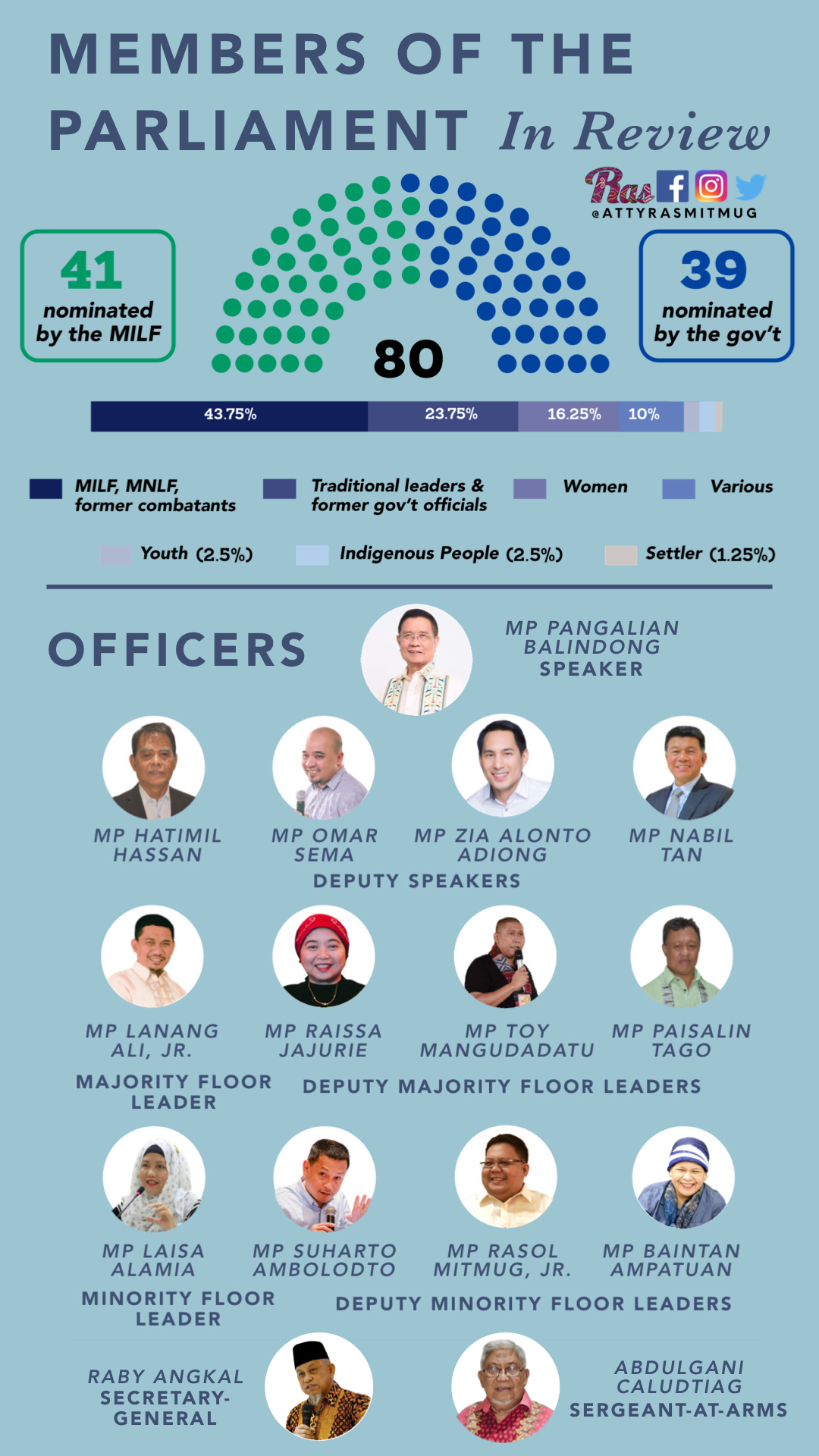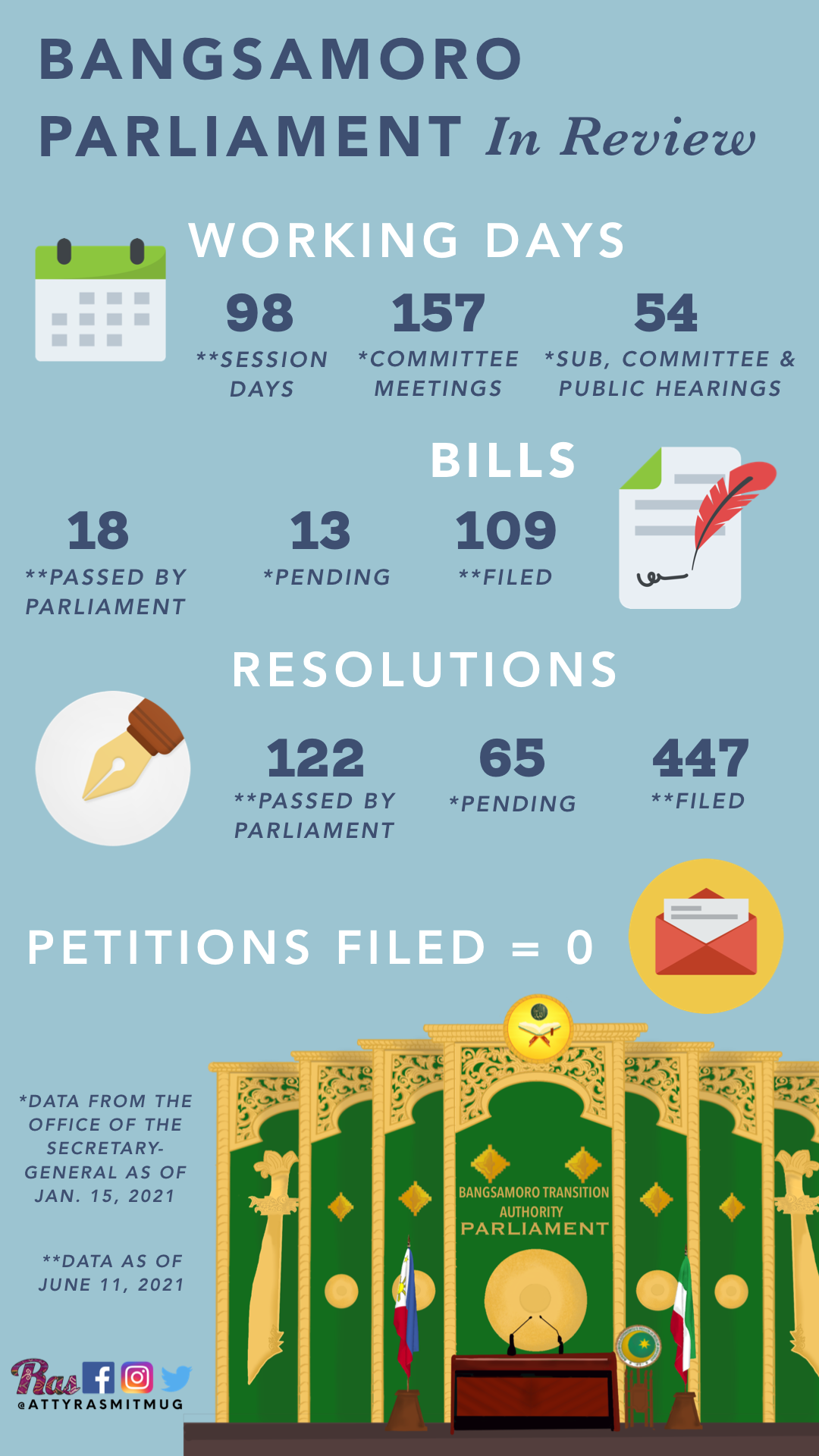As the Bangsamoro Transition Authority is set to commence its Third Regular Session tomorrow, let’s take a look back at the Bangsamoro Transition Authority’s achievements over the past two years and the remaining targets for the remainder of their term.
The BTA is composed of 80 Members of Parliament (MP). During the transition period (2019-2022), the BTA shall be deemed as the Bangsamoro Government for purposes of mechanisms for intergovernmental relations with the national government and local government units in the Bangsamoro Autonomous Region in Muslim Mindanao.
The Bangsamoro Organic Law (RA 11054) provides that executive authority shall be exercised by the Chief Minister and the Cabinet (composed of the two Deputy Chief Ministers and the heads of the 15 ministries), while legislative authority shall be exercised by the BTA.
For the interim Bangsamoro Parliament, 41 members were nominated by the Moro Islamic Liberation Front (MILF), and 39 members were nominated by the national government. They represent the various sectors of the Bangsamoro Autonomous Region: MILF, MNLF, traditional leaders, women, youth, the Indigenous People (IP) and the settlers. (Currently, only 79 seats are occupied, as Deputy Chief Minister Abdul R. Sahrin passed away earlier this year.)

The BTA members elected their Officers during the inaugural session of the Bangsamoro Parliament in March 2019. The Bangsamoro Parliament is headed by Speaker Pangalian Balindong. The Speaker presides on all plenary sessions of the BTA (or may also appoint a presiding officer for the day), maintains proper order and ensures that the parliamentary rules and procedures are followed, and is responsible for the use of the resources, facilities, and supervision over the employees of the BTA.
Deputy Speakers Hatimil Hassan, Nabil Tan, Omar Yasser Sema, and Ziaur-Rahman Alonto Adiong assist the Speaker in the performance of his functions and duties. Specifically, they act as the Speaker in his absence, preside over the session, and recommend appropriate policies and programs to improve the process of legislation.
Majority Floor Leader Lanang Ali, Jr. leads the majority bloc of the Bangsamoro Parliament. He acts as spokesperson and manages the business of the majority bloc, reads the Order of Business at the start of every session and generally directs the flow of deliberations on the floor. By parliamentary tradition, he is also the Chairperson of the Committee on Rules.
Minority Floor Leader Laisa Alamia leads the minority bloc of the Bangsamoro Parliament. Aside from acting as spokesperson for and managing the business of the minority bloc, she defends the minority’s parliamentary rights, and criticizes the policies and programs of the majority. She is also the Vice Chairperson of the Committee on Rules.
The Majority and Minority Floor Leaders are assisted by their Deputies. The Deputies assist the Floor Leaders by mobilizing votes within their respective bloc, and act as floor leader in the absence of the actual floor leaders.
The Deputy Majority Floor Leaders are MP Raissa Jajurie, MP Khadafeh Mangudadatu, and MP Paisalin Tago, while the Deputy Minority Floor Leaders are MP Suharto Ambolodto, MP Baintan Ampatuan, and MP Rasol Mitmug, Jr.
Other Parliamentary Officers who are not Members of the Parliament are the Secretary-General and the Sergeant-at-Arms. Secretary-General Raby Angkal calls the roll at the beginning of every session, oversees the recording of the minutes of debates and deliberations, and serves as custodian for all properties and records of the BTA. Sergeant-at-Arms Abdulgani Caludtiag is responsible for the discipline and security in the BTA, and may take into custody any person(s) who misconduct themselves in the plenary hall.
Other duties and functions of the Parliament Officers may be found in the BTA’s Parliamentary Rules and Procedures. (See: Parliamentary Rules E-book)

In general, the primary duty and responsibility of the BTA is legislation. Members of the Parliament prepare, introduce and work for the passage of legislative measures to effectively address the social, political, and economic needs and concerns within the Bangsamoro.
As of June 11, 2021, the BTA has approved 122 resolutions and 18 laws (Bangsamoro Autonomous Acts). A total of 447 resolutions and 109 bills have been filed in the BTA. They have held 98 session days, 157 committee meetings, and 54 sub-committee, committee, and public hearings*.
RA 11054 specifies the priorities of the BTA in Section 4, Article XVI, which are the following:
- Enactment of priority legislation (Bangsamoro Administrative Code, Bangsamoro Revenue Code, Bangsamoro Electoral Code, Bangsamoro Local Government Code, Bangsamoro Education Code, Bangsamoro Civil Service Code, and Indigenous Peoples Code)
- Determination of parliamentary districts for the first regular election of the Members of the Parliament
- Organization of the bureaucracy of the Bangsamoro Government during the transition period
- Full transfer of powers and properties of the Autonomous Regional Government in Muslim Mindanao to the Bangsamoro Government
- The disposition of the personnel of the Autonomous Regional Government in
Muslim Mindanao - Transition from the Autonomous Regional Government in Muslim Mindanao to the Bangsamoro Government
- Other matters that may be necessary for the protection and promotion of the general welfare of the constituents of the Bangsamoro Autonomous Region.

So far, three priority codes have been passed by the BTA: the Bangsamoro Administrative Code (October 28, 2020), the Bangsamoro Civil Service Code (February 24, 2021), and the Bangsamoro Education Code (May 18, 2021).
The Bangsamoro Local Government Code is still pending at the committee level with the Committee on Rules. The Bangsamoro Electoral Code, Bangsamoro Revenue Code, and the Indigenous Peoples’ Code are still undergoing Cabinet finalization and have yet to be filed by the Government of the Day (GOTD).
For the full timeline of the first three codes, you may click on these links:
There is also no law yet on the determination of parliamentary districts for the first regular elections of the Bangsamoro Government, but this may be included in the Bangsamoro Electoral Code.
As for the transition, the BTA approved the Transition Plan in June 2019, which contained the organizational structures and setup of the BTA and the gradual phasing out of ARMM employees. By December of 2019, most of the ARMM personnel had been let go, except for accountable officials who were extended through approved Resolutions No. 54, 75, and 95. Accountable officials were responsible for wrapping up the accounts and reports of their respective offices and continuing the delivery of services until the hiring of new employees in the new bureaucracy.
The launching of the Bangsamoro Job Portal facilitated the placement process for the hiring of new personnel. The portal has received around 376,362 applications for the 5,263 positions posted by the different ministries and offices of the BARMM.
Though Cotabato City and the 63 barangays in North Cotabato have already been turned over to the Bangsamoro Government, the full transfer of powers and properties of the former ARMM to the Bangsamoro Government is still ongoing.

Of the 18 laws passed by the BTA, seven new agencies/offices have been created:
- Bangsamoro Human Rights Commission (BHRC)
- Bangsamoro Attorney General’s Office (BAGO)
- Bangsamoro Planning and Development Authority (BPDA)
- Bangsamoro Economic and Development Council (BEDC)
- Bangsamoro Women Commission (BWC)
- Bangsamoro Youth Commission (BYC)
- Bangsamoro Sports Commission (BSC)
The BTA also approved Bangsamoro Autonomous Acts No. 1, 2, 7, and 16 on the Bangsamoro Symbols of Authority: the Bangsamoro Flag, the Bangsamoro Emblem, the Bangsamoro Hymn, and the Official Seal of the Bangsamoro Parliament.
To see the list of approved and pending bills and resolutions, you may visit the BTA Official Website. (Read more: On legislative measures: Recapping the Bangsamoro Parliament’s sessions)

Aside from the priorities set in the BOL, what other legislative targets should the BTA accomplish? The Bangsamoro Development Plan (2020-2022) lists the legislative and policy agenda of the Bangsamoro Government, such as the enactment of laws establishing the following institutions:
- Bangsamoro Human Rights Commission
- Bangsamoro Grains Research Institute
- Bangsamoro Irrigation Administration
- Bangsamoro Agriculture and Fisheries Training Institute
- BARMM Integrated Laboratory Services including Crop Protection Center
- Bangsamoro Halal Industry
- Bangsamoro Halal Office
- Bangsamoro Coconut Authority
- Bangsamoro Seaweed Authority
- Bangsamoro Food Authority
- Bangsamoro Rubber Authority
- Bangsamoro Plant and Animal Industry
- Bangsamoro Crop Insurance
- Inland, Marine, and Brackish Water Fishery Management Development Authority (Liguasan Marsh, Lake Buluan, Lake Lanao, Lake Dapao, Lake Balut, Sulu Sea, and Illana Bay)
- Agrarian Reform Adjudication Board in BARMM
- Fishery Adjudication Board
- Body that will administer, supervise, and develop materials for a BARMM scholarship program; and
- Adopting the BARMM R&D Priority Agenda and Providing Funds
Click here to download the Bangsamoro Development Plan (2020-2022). The accomplishment of these targets may also depend on whether the transition period is extended or not.
At the House of Representatives, five bills have been filed seeking to amend the BOL and extend the Bangsamoro Government’s transition period: House Bill 8116, House Bill 8117, House Bill 8161, House Bill 8222, and House Bill 8277 filed by Representatives Loren Legarda, Esmael “Toto” G. Mangudadatu, Ferdinandh Martin G. Romualdez, Mohammad Khalid Dimaporo, and Isidro Ungab, respectively. (Read more: )
At the Senate, Sen. Francis Tolentino defended his measure Senate Bill (SB) 2214 from May 26 to June 2 to postpone the first regional parliamentary elections in May 2022 to 2025. The said bill is still pending as the Senate went into a one-month recess. They are set to resume next month in July. Transcripts of the Senate Plenary Sessions may be read here.
Tomorrow’s Ceremonial Session will be opened by Wali Sheikh Khalifa Nando. Speaker Balindong will address the Parliament, and Chief Minister Ahod Ebrahim will deliver the State of the Bangsamoro Address (SOBA). The session will also be livestreamed on the Bangsamoro Government and BTA Facebook pages, respectively.

